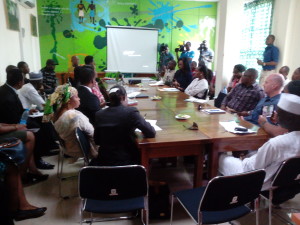Stakeholders have expressed concern over the absence of a proper framework for the procurement and distribution of the clean cookstoves and strategy for engaging key investors in the proper implementation of the clean cookstove scheme.

Furthermore, they are bothered about the proposed beneficiaries of the clean cookstoves (believed to be largely wives of state and local government officials), bringing to fore the legitimacy of some government actions around the distribution of the stoves to rural women.
These sentiments were raised recently Connected Development (CODE), through its “Follow The Money” project, held a stakeholders meeting with representatives from government agencies, private sector, civil society groups and development partners on building an accountable monitoring and financing framework for the clean cookstoves intervention for rural women.
During the meeting, Oludotun Babayemi, co-founder, Follow The Money, noted that “46 days have passed since the approval of the N9.2 billion meant for the purchase of 750,000 clean cookstoves and 18,000 wonderbags, and funds have not yet been released, while stakeholders, totalling about 40 individuals reiterated the fact there was no proper consultation with stakeholders before going ahead with the project”.
On November 26, 2014 the Federal Executive Council approved the sum of NGN N9,287,250,000 for the procurement and distribution of clean technologies to rural women.
Participants at the forum likewise raised the question of sustainability and viability in the clean cookstoves market, as they attempted to differentiate between who the stoves should be given to freely, and those that can afford to buy them.
According to them, the Ministry of Environment’s action with regards to distribution mechanism will have a negative impact on organisations that have been championing the emergence and marketing of clean cookstoves in the country.
“CODE is mainly concerned about when the clean cookstoves will be distributed and whom it will be distributed to, as giving it freely to state and local government wives nominees will disregard the notion that the clean cookstoves are been distributed to the real energy poor women,” said Babayemi.
Against this background, the stakeholders called on the Ministry of Environment, whose representative was absent at the meeting, to consult a wider stakeholder engagement for the implementation of the National Clean Cookstove Scheme and institutionalise a publicly-known mechanism for dissemination of the cook stoves, while making transparent the identities of beneficiaries of the stoves.

Its another way for the government to steal public funds in the name of service to the masses.